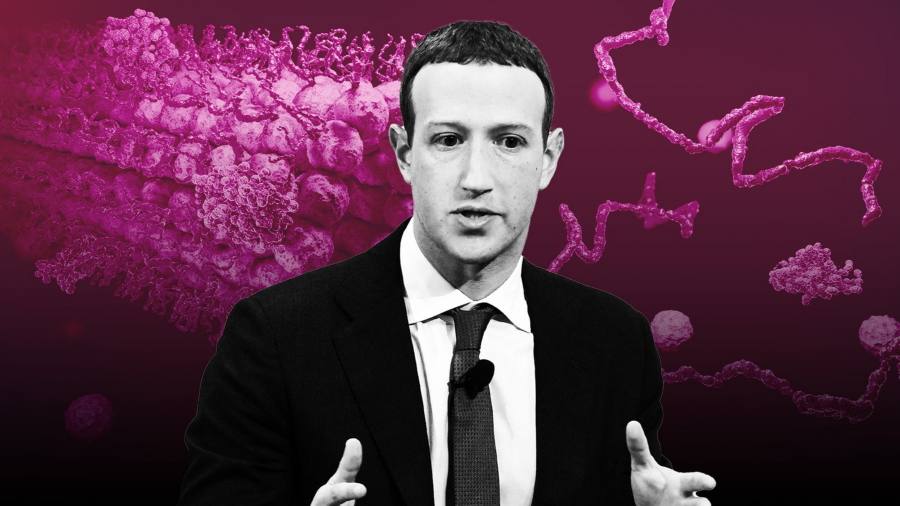Receive free Meta Platforms updates
We’ll send you a myFT Daily Digest email rounding up the latest Meta Platforms news every morning.
Meta has axed a team that used artificial intelligence to create the first database of more than 600mn protein structures, in a signal the company is abandoning purely scientific projects in favour of building moneymaking AI products.
The social media giant had employed a group of about a dozen scientists on a project called ESMFold, which trained a large language model capable of processing vast amounts of biological data to predict protein structures. The effort has been lauded by those involved in the development of new drugs and treatments.
In a previously unreported move, the ESMFold group was disbanded this spring as part of broader lay-offs across the company, three people familiar with the restructuring said.
Though the protein-folding team was small compared with the thousands of AI scientists and engineers still employed at Meta, the move to axe their project showed the company’s desire to abandon blue-sky research in favour of AI projects that can generate revenues, the people familiar with the matter added.
“Meta has tried to align its research strategy to understand more how to create advanced intelligence that can help Meta as a business, rather than just some curiosity projects,” said Yaniv Shmueli, a former research scientist and engineering manager at Meta AI who worked on ESMFold.
Under what chief executive Mark Zuckerberg has described as its “year of efficiency”, Meta has undergone significant restructuring in recent months. This includes a flattening of the management structure and job cuts affecting about 20,000 staff, following calls from investors to focus on profitability and growth.
Meta was one of the earliest big tech groups to invest in artificial intelligence. It set up its Fundamental AI Research (Fair) lab in 2013 to work on research in the area, hiring leading academics in the space.
Over the years, it has published papers and been recognised in the scientific community for advances in AI. However, it has begun to lag rivals such as OpenAI, Microsoft and Google, which all have consumer-facing chatbots that wield generative AI.
Meta’s new focus is to harness its longstanding research and development in the space to create products that jump on the hype around generative AI, a technology that can produce convincing paragraphs of humanlike text, as well as images and video.
A generative AI team headed by Meta’s product chief Chris Cox was set up in February, which now has more than several hundred staffers, including people who transferred from Fair, according to two people with knowledge of the matter.
The Financial Times reported last week that Meta was planning to launch a range of chatbots in the style of different personas as soon as September, in an effort to catch up to competitors.
“Meta remains committed to Fair conducting exploratory research based on open science,” said Joelle Pineau, vice-president of AI research at Meta. “Projects graduating from Fair and moving into other areas of our business has always been a component of how the team operates. This enables us to apply learning and techniques from Fair’s AI research in products.”
Some company insiders said, however, that the academic culture within the Fair lab was partly to blame for Meta’s late arrival to the generative AI boom, because there was insufficient collaboration both between researchers and with the rest of the company.
Tensions also extended regionally, as Meta AI staff in Europe and the US battled to work on top projects and train models, these people added. The company was now trying to reconfigure its Fair research to fit with the aims of the “GenAI” team, one person said.
Meta researchers in November last year released the first database of more than 600mn metagenomic protein structures, known as the ESM Metagenomic Atlas. Metagenomics is the study of little-known proteins in samples from environments across the earth, including microbes in the soil, ocean and human bodies.
The work was considered a rival to DeepMind’s protein-folding prediction technology, AlphaFold, considered a scientific breakthrough in 2020 and comparable to lab methods in its accuracy.
Meta’s ESMFold project trained a large language model to learn evolutionary patterns and generate accurate structure predictions directly from the DNA sequence of a protein. The AI was up to 60 times faster, although less accurate, than AlphaFold.
Meta created an open-source database that allowed scientists to retrieve specific protein structures relevant to their work easily, and said it hoped the work would “fuel further scientific progress”.
Concerns have been raised by academics over whether, in the long term, Meta will still absorb the costs to keep the database running, as well as another service that allows scientists to run the ESM algorithm on new protein sequences.
“Large tech companies may have an advantage in being able to deploy computation resources at scale very quickly and support computationally expensive services for scientists,” said Tim Hubbard, professor of bioinformatics at King’s College London, although he added that he anticipated academics would find ways to continue with such work.
Meta did not confirm whether the service would be maintained in the future, but said the data was at present still available for the research community to use.
Read the full article here




